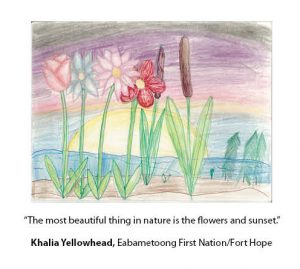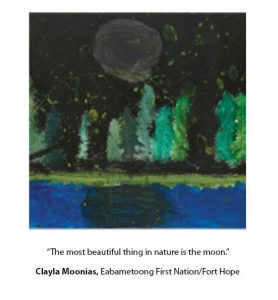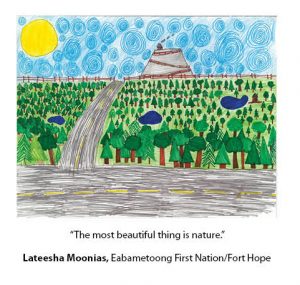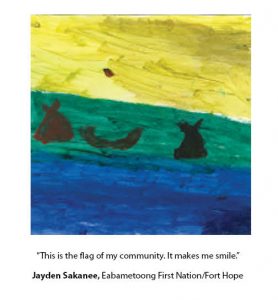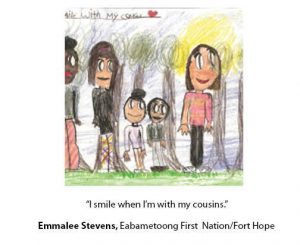 As teachers, we must ensure that today’s generation of Indigenous students, many of whom may be reclaiming their traditional language and customs, and non-Indigenous students have access to authentic opportunities to learn about Indigenous peoples, perspectives and experiences – past and present.
As teachers, we must ensure that today’s generation of Indigenous students, many of whom may be reclaiming their traditional language and customs, and non-Indigenous students have access to authentic opportunities to learn about Indigenous peoples, perspectives and experiences – past and present.
The following suggestions are focused on supporting teachers in the classroom.
Part 1: OTF collaboration and consultation
Part 2: OTF Resources
Part 3: OTF Links
OTF collaboration and consultation
2018 Public Consultation on Education: In OTF’s formal submission to the Government of Ontario’s 2018 Public Consultation on Education, OTF added the following important area of focus with complementary recommendations: Expanding teaching and learning about Indigenous peoples.
In keeping with the spirit and principles of truth and reconciliation, we encourage the government to
- ensure that today’s generation of Indigenous students, many of whom may be reclaiming their traditional language and customs, and non-Indigenous students have access to authentic opportunities to learn about Indigenous peoples, perspectives and experiences – past and present;
- earmark funding for professional learning for teachers and for the development of teacher resources to help them build and deepen their background knowledge about Indigenous peoples, perspectives and experiences – past and present;
- support opportunities to build collaborative relationships and reciprocal partnerships between teachers and Indigenous communities, organizations, Elders and knowledge keepers; and
- continue to support the work of the Minister’s Advisory Council on First Nations, Métis and Inuit Education, the Indigenous Education Office, and the Joint Implementation Work Group to deliver on the TRC’s Calls to Action and to achieve the goals set out in the Ontario First Nation, Métis and Inuit Education Policy Framework (2007).
OTF, as the voice of Ontario teachers, is a member of the Minister’s Advisory Council on First Nations, Métis and Inuit Education which provides counsel on matters germane to Indigenous education.
OTF was a member of the government-convened 2017 Joint Implementation Work Group which was tasked with identifying recommended revisions to the Social Studies (Grades 4-6) and History (Grades 7-10) and Civics (Grade 10) curricula to increase and deepen the focus of teaching and learning about Indigenous peoples, perspectives and experiences.
OTF Summer Institutes: Since 2014, one of the priority areas of focus of our three-day OTF Summer Institutes has been infusing Indigenous perspectives and leveraging authentic Indigenous voice and experience. OTF has worked with the First Nations, Métis & Inuit Education Association of Ontario and Facing History and Ourselves (Canada) to offer immersive and intensive Indigenous-focused learning in various cities across Ontario.
Indspire National Gathering: OTF has been a sponsor/supporter of this pan-Canadian event since 2016.
OTF resources
Books of Life: Books of Life was an OTF Indigenous education awareness and literacy initiative, funded by the Aboriginal Education Office (AEO) of the Government of Ontario. The project sought to engage teachers in a greater understanding of First Nation, Métis and Inuit (FNMI) communities, so that they could confidently imbed FNMI themes, topics and perspectives in their teaching. During the 2011-12 school year, Books of Life brought together teachers in schools with high FNMI populations and those in schools with low FNMI populations. The teachers worked with their students to create books about their lives – exploring who they are, what they value, what they celebrate, and how all of our lives are shaped by our cultural and historical contexts.
First Nations, Métis & Inuit Education Association of Ontario: One of the 50 subject/division associations with which OTF works closely is the First Nations, Métis & Inuit Education Association of Ontario (FNMIEAO). They support and help all educators understand issues related to First Nation, Métis and Inuit Peoples in Canada as well as offer strategies for teaching this content to all learners. They have an extensive collection of resources to help with school projects or related educational exercises.
OTF Connects webinars
Truth and Reconciliation in the Classroom: This webinar focuses on how to use The First Nations, Métis & Inuit Education Association of Ontario’s (FNMIEAO) newest comprehensive resource: Truth and Reconciliation in the Classroom. It includes numerous high-quality videos on a multitude of topics such as geography, treaties, history, leadership, community life and more. Connections to the new curriculum as well as ready-made classroom activities in both English and French are available through the accompanying Teacher’s Guide. Links to student-friendly worksheets are also available. Focus is on grades 4 & 5 new curriculum. However, this can be used for any grade and subject K-12. The webinar also shows how this resource can be used to support Learning from Home with examples using Google Classroom and Brightspace (D2L).
Implementing Indigenous Education in Social Studies and History – Part 1: This webinar is designed to support educators on how to effectively embed First Nations, Métis and Inuit histories and traditions into their social studies and history classes in Grades 4 – 6 and Grades 7, 8, and 10. Participants will be provided with inquiry starting points and suggested resources. In Part 1, teachers will build an understanding of Indigenous worldviews and protocols, including the importance of local relationships and what it means to do this work in a good way and develop an understanding of the changes to the social studies and history curricula.
Implementing Indigenous Education in Social Studies and History – Part 2: This workshop is designed to support educators on how to effectively embed First Nations, Métis and Inuit histories and traditions into their social studies and history classes in Grades 4 – 6 and Grades 7, 8, and 10. Participants will be provided with inquiry starting points and suggested resources. In Part 2, teachers will enhance their own learning about the complete histories of Canada, know where to find reliable resources to support their own and student learning, and use the inquiry process to guide their own and student learning on indigenous histories and contemporary realities.
Gwaayaksichiweyan – Making Things Right: This webinar supports teachers with the implementation of the revised Social Studies and History curriculum. In response to the Calls to Action from the Truth and Reconciliation Commission, it is now mandatory for students to be learning about the histories, perspectives and contributions of Indigenous Peoples in what is now Canada. Participants will
- build an understanding of the history of Indigenous Peoples in Canada,
- examine how colonialism has and continues to impact Indigenous Peoples today,
- provide strategies and resources to support professional practice,
- develop an awareness on possible bias and misconceptions, and
- create healthy and inclusive learning environments that promote equity and wellbeing.
Survive and Thrive: This is OTF’s online tool designed to support beginning teachers, occasional teachers, mentors and teacher candidates, mainly those in their first one to five years of practice, though even seasoned teachers use it, too. Its homepage currently features resources connected to “Confronting the Legacy of Residential Schools.”
Inspire Financial Learning: In 2018, OTF contracted with two Indigenous educators from the Six Nations of the Grand River First Nation to develop a two-part lesson that infused authentic Indigenous teachings and voice with financial literacy concepts. The lessons are entitled Conceptualization, Creation and Construction of the Mohawk Village Memorial Park, Parts 1 & 2. These lessons respond to the Truth and Reconciliation Commission’s Calls to Action #62 and #63 and are designed by using a land-centred and circular indigenous framework of vision, relationships, knowledge and action.
Teacher Learning Co-op (TLC): The TLC projects involved teams of teachers working together to research and pursue a project with a follow-up report (by teachers, for teachers). Following are the projects and summaries of their reports related to Indigenous education.
Integration of Indigenous Content Through Experiential Learning into Existing Curriculum: The intent was to increase student engagement as well as awareness of Indigenous issues, perspectives and knowledge through the integration of Indigenous content and Ways of Knowing into the current curriculum. In order to do this, the team realized that teachers must be engaged and comfortable when facilitating this learning in their classrooms. They ran a pilot project in one of their communities with schools that service a First Nations community to see if they could help teachers feel more confident in including Indigenous issues, perspectives and knowledge into their lessons. The first part provided a 10-week collaboration between classes in the elementary panel and a class in the secondary panel to create legends inspired by Algonquin teachings about Turtle Island and animal characteristics. The culmination of this collaboration was an Indigenous film festival. The second part provided an opportunity for teachers from both panels to visit the First Nations community, hosted and facilitated by First Nations members.
Infusing Indigenous Perspectives and Indigenous Ways of Knowing into Mathematics: This project is a continued response to the Truth and Reconciliation Commission of Canada’s recommendation as well as the mandate of the Ontario Ministry of Education Policy Framework. There are several First Nations connections to mathematics (i.e., creation of traditional wigwams, creating quill boxes and beadwork) that would require geometry skills as well as moccasin-making focusing on patterning skills. This project examined how to deepen teachers’ understanding of math connections to Indigenous art and perspectives. As well, the project focused on deepening the understanding of how to engage community members in the teaching and learning of mathematics to ensure their voices and culture is acknowledged.
OTF links
The OTF Useful Links web page has over 50 links to websites which support teachers in Indigenous education. Following is a sample of the links.
Orange Shirt Day: Orange Shirt Day on September 30 is designed to commemorate the residential school experience, to witness and honour the healing journey of the survivors and their families, and to commit to the ongoing process of reconciliation. Lots of English and French teacher resources geared to Grades 5 and up and an Orange Shirt Day curriculum for K to Grade 6.
Medicine Wheel Education: This organization empowers Indigenous Storytellers and Elders to publish authentic cultural stories designed for the classroom. There are 20 books available as well as educational curriculum-based lesson plans and posters. Books and resources are available in English and French. Elementary focus.
National Centre for Truth and Reconciliation: The National Centre for Truth and Reconciliation (NCTR) was created to preserve the memory of Canada’s Residential School system and legacy. Its website contains excellent resources for educators and others.
Free Truth and Reconciliation Content for Educators: The OISE Library has compiled a list of 50 freely accessible resources regarding Truth and Reconciliation and Indigenous Education for educators across the province. These materials are largely created by Indigenous authors and creators, and include films, mobile phone applications, websites, curricula and lesson plans.
National Centre for Collaboration in Indigenous Education (NCCIE): The National Centre for Collaboration in Indigenous Education (NCCIE) was created by Indigenous peoples and is hosted by the First Nations University of Canada. The NCCIE connects communities with each other to share their stories about Indigenous education across Canada and around the world.
CTF’s Speak Truth to Power: This adaptation of the gripping human rights project by the Canadian Teachers’ Federation includes testimonies by three Indigenous Canadians (Wilton Littlechild, Mary Simon and Tim Thompson), in English, French and the mother tongue of each activist (Cree, Inuktitut and Mohawk). Lesson plans can be used with students from Grades 5 to 12.
CTF’s Online Lesson Plans on Truth and Reconciliation: The Canadian Teachers’ Federation presents elementary and secondary lesson plans, discussion questions and a list of resources, as part of its Imagineaction social justice program. Register for free to access these teacher resources and more.
Joining the Circle: A multimedia toolkit developed by COPA and OTF, with an educator’s guide and 10 short animated films in six Indigenous languages. Topics include pride and identity, understanding racism and discrimination, building and strengthening relationships with families and nurturing safe and healthy schools and communities.
Paths to Reconciliation: Developed by the Royal Canadian Geographical Society (RCGS) and funded by the Government of Canada’s Department of Heritage, Paths to Reconciliation includes a website and a suite of educational resources built from the first-hand accounts of residential school survivors.
Legacy Schools Program: This program is a free national initiative to engage, empower and connect students and educators to further reconciliation through awareness, education and action (#reconciliACTION). Educators can sign up as Legacy School to get a free DWF toolkit which include copies of the Secret path, resources, posters, a guidebook and more.
Full Circle: First Nations, Métis, Inuit Ways of Knowing: Part of the Ontario Secondary School Teachers’ Federation’s (OSSTF) Common Threads project, Full Circle, contains cross-curricular lesson plans and resources for secondary schools, designed for use in a wide range of courses, including civics, history, social sciences, English, geography, business, careers, physical education and science.
4 Seasons of Reconciliation: Multi-media resources for secondary school teachers and students, aimed at promoting awareness and reconciliation. The student assignments, including many video links, are accessible without sign-up.
Indspire: K-12 Institute for Educators: Indspire’s K-12 Institute connects educators of Indigenous students with programs, resources, information, tools and a Professional Learning Community to improve educational outcomes and increase high school completion rates.
Frontier College: Frontier College works in communities across Canada to provide literacy support to the people who need it most. They provide programming directly to individuals and also help community groups set up and maintain programs, including reading circles and homework clubs.
Aboriginal People: Media Smarts focuses on many issues that are specific or unique to Aboriginal people in Canada, including the underreporting of crimes against Aboriginal people by news media and the unique challenges faced by Aboriginal people seeking to produce content for their own communities.
Moose Hide Campaign Learning Platform: The Moose Hide Campaign is a grassroots movement of Indigenous and non-Indigenous men and boys who are standing up against violence towards women and children. The Moose Hide Learning Journey is designed to support teachers in offering just such a learning environment while providing students with opportunities to explore alternative values and perspectives that respect and honour women and children. The site offers supports for teachers of K-12 and classroom supports.
Facing History and Ourselves: This non-profit organization works with teachers, students, and communities everywhere, through online professional development, international events, and free library of classroom resources.
Project of Heart: Project of Heart is an inquiry based, hands-on, collaborative, inter-generational, artistic journey of seeking truth about the history of Aboriginal people in Canada. Its goals are to examine the history and legacy of Indian Residential Schools in Canada and to seek the truth about that history, leading to the acknowledgement of the extent of loss to former students, their families and communities; to commemorate the lives of the thousands of Indigenous children who died as a result of the residential school experience; and to call Canadians to action, through social justice endeavors, to change our present and future history collectively
The Martin Family Initiative: A website with a virtual library of promising practices to improve educational success for Indigenous students.
National Film Board (NFB) Educational Playlist on Indigenous Voices and Reconciliation: A rich selection of documentary films available for free from the NFB by Indigenous film makers and about Indigenous themes.
The Witness Blanket: An amazing collection of pieces gathered from residential schools across Canada. The exhibition itself is housed in the Canadian Museum of Human Rights in Winnipeg. A video explaining the installation can be found at https://youtu.be/6alxTwo2X84.
The Moccasin Project: A grassroots, national campaign to raise awareness about Indigenous children impacted by the child welfare system in Canada.
The Red Dress Project: Winnipeg artist Jaime Black has put together a thought-provoking artistic response to missing and murdered Indigenous women in Canada.


